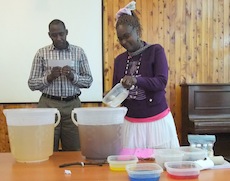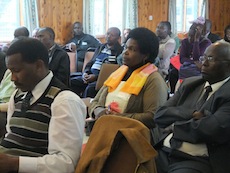| |
|
 |
ARC holds a sustainable agriculture workshop in Kenya
May 17, 2012:
 |
 |
 |
Delegates play 'the lake game' in which scenarios involving various environmental choices show how Kenya's Lake Victoria becomes increasingly polluted |
Kenya has lost 50% of its forest cover in the last 30 years, according to a government report. That was the disturbing statistic heard by faith leaders yesterday at a workshop in sustainable agriculture and creation stewardship organised by ARC in Kijabe, Kenya, this week.
The environmental crisis facing Kenya was laid bare before 50 ministers from the Methodist Church in Kenya and the Presbyterian Church of East Africa, who are taking part in a three-day workshop organised by ARC and Care of Creation Kenya, a Kenya-based Christian organisation dedicated to awakening the church to its responsibility to environmental care.
 |
| Kenya's forest cover is depleting at an alarming rate, according to The Nation newspaper. It quoted Green Africa Foundation chairman Isaac Kalua telling Kenyan president Mwai Kibaki the country was losing 5.6 million trees daily due to charcoal burning, harvesting and collection of firewood. Charcoal is Kenya’s third largest agricultural industry, worth 32 million Kenyan shillings (KES) a year compared to tea (41.2 million KES) and horticultural exports (32.6 million KES). The president later told a rally that Kenyans must dedicate at least 10% of their farms to planting trees. |
|
 |
 |
The workshop combines the religious basis for caring for the environment with practical training in a faith-based form of sustainable agriculture called Farming God’s Way.
Restoring degraded landThis conservation farming method was borne out of the American dust bowl of the 1930s when decades of intensive farming, drought and intense wind storms literally blew away the soil. Now it’s being used in Africa to restore degraded land and dramatically boost crop yields.
"Conservation agriculture is Farming God's Way without God," says Craig Sorley. "But it's the God part of this picture that really changes attitudes."
It is based on minimal disturbance of the soil (no tillage), permanent organic cover in the form of mulch, composting and crop rotation. As well as reducing drudgery and labour for smallholder farmers by up to 50%, this farming method nourishes the soil and enables it to retain water much better, which means it’s particularly useful in dry areas.
Craig Sorley has a demonstration farm at Kijabe where he shows how crops fare under the Farming God’s Way method compared to conventional agriculture.
 |
 |
 |
Delegates at the workshop |
He recently harvested 89 kilos of potatoes from the Farming God’s Way plot compared to 51 kilos of potatoes from the conventional plot. His bean harvest was even more impressive – three and a half times as much from the Farming God’s Way plot compared to the conventional plot.
“They are planted on the same day, same variety, same amount of small amount of inorganic fertiliser applied and this is all rain-fed agriculture,” he says.
Simple and achievable“The beauty of this is that it’s simple, it’s achievable, you use your own resources in the community – you don’t have to bring in fertilisers and seeds from the outside – it’s just a change in management and a change in commitment to the soil itself. If we restore the soil we will bring more food into our families.”
 |
| "It’s a big opportunity that we can touch the soul of a man and shape it” - Augustine Muema |
|
 |
 |
The faith leaders found his message deeply inspiring. As well as planning to train their own communities in conservation agriculture, they said it was vital for the church to take a lead in caring for God’s creation.
Augustine Muema of the Methodist Church in Kenya said: “We need a behaviour change; knowledge by itself has not been able to do it. That is exactly the importance of the church because we talk to people about their values, about their belief systems, and that’s why I think the coming of the church into environmental issues will really help change things.
“So let’s not take it for granted; it’s a big opportunity that we can touch the soul of a man and shape it in the church.”
|
 |
 |
|
|
|
|
|

